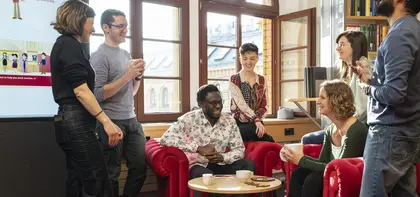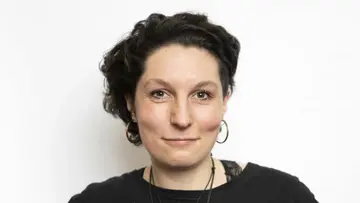
Focus Areas of our Equal Opportunities Work
Building Inclusive and Safe Spaces
The goal of this focus area is to build inclusive and safe spaces, particularly for women, trans, non-binary, and people experiencing intersectional discrimination within the category of gender. To this end, we are implementing two measures. Firstly, we changed about half of the restrooms in the institute to non-gendered restroom spaces. This structural change of the building directly impacts trans, non-binary, and inter-sectional gendered groups by giving the access of each of the employees a bathroom that they will feel comfortable using within a very short walking distance on the same floor. We note that this change does not address the intersectionality of people with disabilities who require a wheelchair-accessible bathroom. Though we do have two such restrooms, we don't have the capacity to make more of our restrooms suitable for people who need such a restroom due to architectural constraints.
The second measure concerns establishing a regular lunch meeting for underrepresented individuals at the institute. The title "FLINTAQ*" is a German acronym that stands for "Women, Homosexuals, Intersex, Non-binary, Trans, Agender, Queer, etc." The choice of this name is used to help educate the larger MPI MiS community about this acronym used in communities across Germany to address the intersectionality of gender and sexual orientation. Though the terminology is not perfect, it is currently used in communities around Leipzig. When anyone asks, they are, of course, welcome to join the lunch; we simply ask that those who are not typically underrepresented in mathematics take this lunch as an opportunity to mainly listen without judgment, creating a safe space for those who identify as underrepresented. Invitations to this lunch are sent out via email to all who are currently affiliated with the MPI and to all guests.
In addition, we regularly advertise the Max Planck Society seminars and training and occasionally organize such events ourselves.
For details, please check the Intranet (MAXnet) page of the Equal Opportunities Office.
Deputy Gender Equality Officer
Dr. Ulla Weber Dr. Ulla Weber
Phone: +49 / 89 / 2108-1421
Email: ulla.weber@gv.mpg.de

